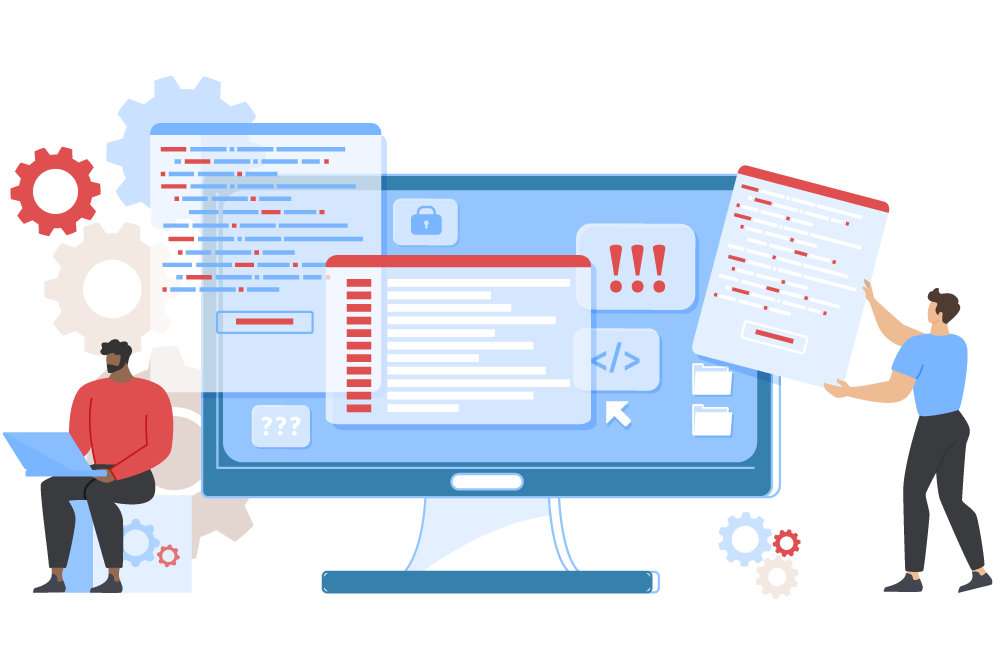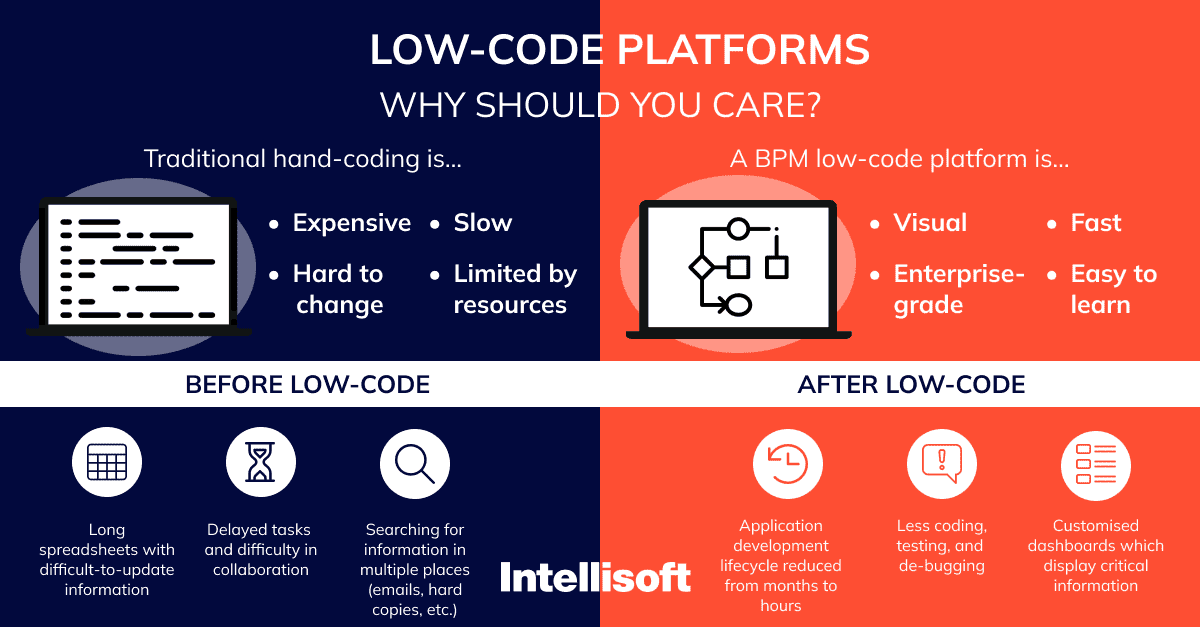Excellent Reasons On Deciding On Legacy application modernization with Low-code
Excellent Reasons On Deciding On Legacy application modernization with Low-code
Blog Article
Benefits Of Developing Applications Using Low-Code In Terms Of Speed
Visual Development Environment:
Drag-and-Drop Interfaces: Low-code platforms provide visual tools for designing applications. Drag-and-drop tools enable developers to rapidly build applications without having to write extensive code.
Templates and pre-built components A lot of low-code platforms come with pre-built components as well as templates that allow developers to rapidly prototype and build applications.
Reduced Coding Requirements:
Automated code generation: Low-code systems generate the codes that are used to build them based on the visual models developed and maintained by the developers. This helps reduce the need for manual code coding and accelerates the development process.
Reusable Components: Developers are able to make use of reusable components across various projects, thus reducing the time they spend creating and testing code.
Collaboration can be streamlined.
Low-code platform tools typically include testing, versions control deployment. This enables seamless collaboration between teams.
Citizen development: By using user-friendly interfaces and reducing bottlenecks that are often caused by lack of developers, business users as well as non-developers can contribute towards application development.
Rapid Iteration and Prototyping
Fast Prototyping Developers can quickly create prototypes of ideas that can be tested and feedback collected, resulting to faster iteration.
Easy Modifications: The visually-oriented design of low-code programming makes it simpler to make changes and updates to applications, which speeds up the process of improving and refining applications based on user feedback.
Pre-built Integrations:
API Integrations. Many low-code platforms include connectors designed for the most popular APIs and services. This will reduce the time to integrate systems.
Data integration tools: Tools for data integration are built in to simplify the process.
Deployment & Scaling
One-Click Installation: A lot of low-code platforms have a single-click installation option, reducing the amount of effort and time needed to install applications.
Cloud-based solutions: Cloud platforms with low-code allow developers to concentrate on the design and function of their applications instead of worrying about the logistics of deployment.
Overall, low-code development has the advantage in terms speed because of its capability of automatizing and simplifying a variety of aspects of development. This allows faster delivery of apps and easier adapting to the changing demands. Take a look at the best Low-code Platform for application development for website info including develop web app, rapid app development, azure sql server, mobile development platforms, build with docker, ms azure sql, develop web application, multiplatform mobile app development, app development platform, cross platform app development and more.
The Benefits Of Low-Code Development In The Areas Of Governance And Security
Low-code development can bring many advantages in terms of security and governance. They are essential to ensure that apps are safe, secure and properly managed throughout their lifecycle. Here are a few key advantages.
Unified management console: Low-code platforms typically have a central administration console where administrators manage all applications and maintain a consistent governance within the company.
Role-Based Access Control RBAC : These platforms typically include roles-based access controls, which enable administrators to create and enforce policies. This guarantees that only authorized users are able to access or modify certain parts of an application.
Compliance and Regulatory Adherence
Features of compliance: Many platforms that use low-code are designed to be in line to industry standards. They offer frameworks and tools to ensure that applications comply with requirements.
Audit Trails and Logging : Complete logging, audit trails and logs are typically integrated into businesses which allows them to monitor changes and track access. They can also ensure compliance of both external and internal rules and regulations.
Increased Security Measures
Data encryption: Low-code platforms often offer built-in data encryption in transit and at rest. This ensures that data sensitive information is protected.
Security Certifications: A lot of low-code service providers have security certificates (e.g., ISO 27001, SOC 2) that show that they adhere to the highest security standards, providing an additional level of security to customers.
Automated Security Updates
Regular security updates and patches : Low-code platform handle automated security patches, updates and updates. Thus, applications are protected from current threats without developer intervention manually.
Security Monitoring: Constant security monitoring tools are used to send real-time notifications and insights on potential security issues.
Data Governance
Data Access Policies These systems permit organizations to define data access policies and then enforce these policies to ensure that the data is only accessible to users who are authorized. They also make sure that the data is used correctly.
Data Masking and Anonymization The built-in tools that mask and anonymize data help safeguard sensitive data in testing and development environments.
Consistent Application Management:
Development and deployment Pipelines Low-code platforms provide integrated pipelines for development and deployment that contain security checks. These ensure that security is maintained throughout the entire life cycle of an application.
Version Control: The integrated version control allows for the management of modifications and makes sure that changes to the application can be identified and changed if necessary while ensuring the integrity of the application.
User authentication:
Single Sign On (SSO) Supporting single sign-on and other advanced authentication methods reduces the burden of managing users and increases security.
Multi-Factor Authentication - Many platforms allow multi-factor Authentication, which adds an additional layer of security when accessing apps.
Policy Enforcement Monitoring and Compliance:
Policy Templates: Low-code platforms usually have pre-defined templates for security and governance that allow organizations to quickly apply policies.
Tools for Compliance Monitoring: These tools are able to monitor and provide continuous reports on the status of compliance. They make it easier to spot problems and address them in a proactive manner.
Integration with Existing Security Infrastructure
Seamless Integrate: Low-code platform are designed to integrate seamlessly with existing security infrastructure and tools, including identity management tools SIEMs (Security Information and Event Management Solutions), and firewalls.
API Security: API integrated security makes sure that integrations with an external systems are secure. Secure data and ensure application consistency.
Training and best practices
Numerous platforms provide guides and best practices to secure development of applications. They help non-developers meet security standards.
Some lowcode providers provide resources and security training for users to understand how to build and maintain secure application.
Overall the security and governance advantages of developing applications using low-code ensure that applications are built and managed in a secure, compliant, and controlled manner. These platforms provide the frameworks and tools necessary to safeguard sensitive data and enforce policies, as well as maintain regulatory compliance while simplifying the management and oversight. Check out the top Legacy application modernization with Low-code for site advice including ms azure sql, build a docker container, database in azure, multiplatform mobile app development, app dev platform, application development platforms, mobile app development platforms, app modernisation, developing mobile apps, cross platform mobile dev and more.
Advantages Of Low-Code Application Development In Terms Of Vendor Support And Community
Low-code development platforms for applications are a great way to get vendor support and community involvement. Both are vital for ensuring a successful implementation and ongoing maintenance of the application. Support for Vendors
Comprehensive Technical Support:
A Support Team Dedicated: Most low code platforms have dedicated support personnel who are available to help with technical queries, troubleshooting issues and providing assistance. They can ensure that issues are addressed promptly.
Support is available 24/7: A lot of vendors offer 24/7 support, which can be particularly useful for businesses that operate across different time zones.
Training and Onboarding
Vendors offer structured training programs such as webinars, tutorials and certifications to help users become familiarized with the platform.
Personalized onboarding: Many vendors have customized services for customers who are new, to help them implement the platform correctly and tailor it to suit their needs.
Regular Updates & Enhancements
Continuous Improvement: Low code platform providers provide regular updates that include new features, security patches and enhancements to performance. This ensures that the platform remains up-to-date and safe.
Feedback Integration: Many vendors integrate user feedback in their process of development. This ensures that the platform is able to adapt to the ever-changing needs and wants of its customers.
Comprehensive Documentation:
Documentation is comprehensive: Users are usually able to access extensive and well-organized documents, ranging in complexity from simple customization to advanced.
API References API documentation contains complete API references that can help developers integrate their low-code platform applications with other platforms.
Consulting and Professional Services
Expert Consulting: Vendors often provide consulting services that assist with strategic planning as well as design of architecture and complex implementations, ensuring that users have the ability to leverage the platform to its fullest potential.
Custom Development Services: Certain companies provide custom development services to create specific integrations or features that are not included in the default.
Community Support
Active User Communities
Discussion boards and forums A lot of platforms with low-code offer a lively online community where users can ask for help, share solutions, and work together to discover the most effective techniques.
User Groups and Meetups Local and virtual user groups and meetups provide opportunities for networking, learning and sharing experiences with other users.
Knowledge Sharing and Collaboration
Community-Contributed Resources: Users often share templates, modules, and extensions that they have developed, which can be reused or adapted by others, accelerating development and innovation.
Crowdsourced Solution Finding: The collective experience and wisdom of a group can be an excellent resource for finding solutions to complex problems.
Development and learning:
Community-led training: Many communities offer webinars, workshops and training sessions facilitated by experts in the field.
Online Courses and tutorials Community members frequently create and share online courses, tutorials, and how-to guides, making better education resources available to all users.
Feedback and Influence
Product Feedback Channels Community forums include many channels to provide feedback to vendors. This will help in the development of new features.
Beta Testing: Members of active communities might be eligible to take part. This lets them gain early access to the platform and be involved in the development of the platform.
Recognition and Encouragement
A lot of vendors have community recognition programs, such as MVP programs (Most Valuable Professional) to acknowledge the efforts of their members who are involved in their communities.
Peer Support : Members of the community provide peer support to others, sharing their experience and providing advice. They create a collaborative and supportive atmosphere by sharing knowledge.
Overall, the combination robust vendor support and an active and engaged community results in an extensive support ecosystem for the development of low-code applications. This ensures that users are able to access the resources as well as the expertise and collaboration opportunities needed to successfully create, deploy, and maintain their applications, ultimately enhancing productivity and innovation.